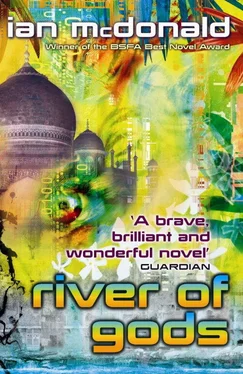LANGUR: also known as Hanuman’s monkey. Monkeys are therefore sacred in India. LARRI-GALLA: a workshop among housing. LASSI: cool yogurt-based drink.
LAVDA: penis, prick.
LINGA: phallus as a sacred object, usually in the shape of a rounded stone. MACHAAN: an observation platform in a tree for big-game hunting. MADAR CHOWD: same as behen chowd, only this time it’s your mother. MADRASSA: Islamic school where Arabic and theology are raught. MALI: a gardener.
MELA: a gathering of people: anything from a big family get-together to the Kumbh Mela.
MEVLEVI: Turkish sufi order, originators of the “whirling dervish” dance.
MOKSHA: release from the cycle of death and reincarnation. Those who die by the Ganga achieve moksha, thus encouraging the peculiarly Indian institution of “death-tourism.”
MUDRA: hand gesture in Indian classical dance, conveying great subtlety of meaning.
MUSNUD: Mughal throne, a simple large slab of marble upholstered with cushions.
NAGA SADHU: the naked sadhu, who goes sky-clad to show his disdain for the world of illusions.
NAQQAR KHANA: ceremonial gatehouse with turret for drummer and musicians to welcome guests.
NAUTCH: traditional semiformal dance party for the entertainment of gentlemen.
PAAN: a near-ubiquitous confection of spices, nuts, and a mild narcotic wrapped in a betel leaf. Makes your gums red, a bit of a giveaway.
PALLAV: the section of a sari worn over the shoulder, usually richly decorated.
PANDAL: marquee or stage made of cloth and bamboo.
PARIKRAMA: Clockwise sunwise circuit of a Hindu or Buddhist sacred site.
PHATPHAT: motor rickshaw, ubiquitous and terrifying.
PRASAD: sacred food, food offering.
PUJA: prayer and offerings to deities.
PURDAH: the segregation of the sexes in traditional Islam and Hinduism. PURI: deep-fried puffed bread, often stuffed. Delicious if appallingly calorific. QAWWALS: Islamic songs of praise, as opposed to ghazals, songs of love.
RATH YATRA: divine temple/chariot, the vehicle of Rama, the centrepiece of the Orissa jagannath (juggernaut) celebration.
ROTI: Indian fried flatbread.
SADHU: Hindu ascetic, holy man. (For woman, see sadhvi.) SADHVI: female sadhu . Hindu nun who has renounced worldly things. SAMADHI: the meditative state of undifferentiated “Beingness.” SANGAM: spit of sand where sacred rivers meet. SANYASI (PLURAL: SANYASSINS): priest(s).
SATHIN: informal village social worker (literally “friend”): usually female, often doubles as midwife.
SATI: the (now illegal) custom of widows burning themselves on their husbands’ funeral pyres. Sati stories crop up several times a year even today, usually in rural Rajasthan.
SATTA: originally illegal betting on commodity prices, generally extended into any kind of dodgy bookies.
SEMA: the dervishes’ mystical whirling dance. SEPOY: old Raj term for native infantry.
SHAADI: wedding preceremony. Also India’s biggest online matrimonial agency. SHAMYANA: a decorated awning over the front of a building. SHATABDI: Indian high-speed express train.
SHERWANI: long, richly decorated frock coat usually worn by Islamic men. SHIKARA: main spire on a North Indian temple. SMASANAKALI: that aspect of Kali that rules over the funeral ghats. SOWAR: Indian elite cavalry.
SUBADAR: Indian military commissioned officer roughly equivalent in rank to captain.
SUDDHAVASA: one of several intermediate heavens in Mountain Buddhism, literally “Abode of the Pure.”
SUNDARBAN: the tiger-haunted jungles of the Ganga/Brahmaputra delta. In context, equally wild and dangerous data-havens for breeding unlicensed software.
SURA: verse of the Holy Koran.
SURYA NAMASKAR: the salutation of the sun, a sequence of yoga asanas performed at dawn to greet the sunrise.
SWABHIMAN: self-respect, both personal and national.
SWAMI: Hindu honorific similar to “master,” implying mastery of body and soul. TAMASHA: festive excitement.
TANDAVA NRITYA: Shiva’s cosmic dance of destruction—and regeneration. THALI: a metal dish, also a selection of different foods on one compartmentalized dish. TILAK: sacred mark of the forehead. Siva and Vishnu have different ones. TIRTHA: a divine ford, or a crossing place between the mortal and the divine worlds. TRIMURTI: the Hindu “trinity” of Brahma, Vishnu, and Siva.
TRISHUL: sacred trident of Siva, carried by devotees. Often made from empty ghee or Red Bull cans.
VAHANA: the animal “vehicle” of each god: Brahma the goose, Durga the tiger, Ganesha the rat.
VAJRA: the divine thunderbolt of Indra, ancient Aryan Vedic god of rain and thunder—in many ways analogous to the Scandinavian Thor.
VARNA: the divinely ordained system of caste, the main groups being Brahmins, Kshatriyas, Vaishyas, and Shudras, conforming roughly to priests, warriors, traders/farmers, and servants. Beneath them all come the Dalits .
VASUS: in Vedic Hinduism, the eight attendants of Indra: means “excellent.”
VIBHUTI: white scared ash-powder worn by Sadhus in devotion to Siva.
WALLAH: “fellow”: a very common suffix, as in “chai-wallah” and “dhobi-wallah”
YAKSHAS: semidivine beings living under the Himalayas.
YALI: mythical leaping leonine beast.
YONI: the vagina as sacred source.
ZAMINDAR: Indian village landowner.
ZENANA: the women’s part of a traditional Muslim house.
Thanks to Ritu Parvaaz for Hindi assistante.
The soundtrack to River of Gods features tracks from the following artists.
Talvin Singh, Thievery Corporation, A.R. Rahman, AmarBaaba Maal, Asian Dub Foundation, Autechre, Badmarsh and Sri, Bjork, Black Star Liner, The Blue Nile, Boards of Canada, The Chemical Brothers, Dead Can Dance, The Fake Portishead, Future Sound of London, Godspeed You! Black Emperor, Goldfrapp, Jamyang, Joi, Jeff Buckley, Kabhi Kushi Kabhie Gham : original movie soundtrack, Nitin Sawhney, Nusrat Fateh Ali Khan, Rakesh Chaurasia, Sigur Ros, State of Bengal.
Ian McDonald is the author of many science fiction novels, including Desolation Road, King of the Morning, Queen of the Day, Out on Blue Six, Chaga , and Kirinya . He has won the Philip K. Dick Award and the British Science Fiction Association Award for Best Novel, been nominated for a Hugo Award, and has several nominations for the Arthur C. Clarke Award. He lives in Belfast, Northern Ireland.












